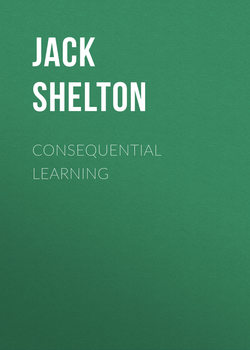Consequential Learning

Реклама. ООО «ЛитРес», ИНН: 7719571260.
Оглавление
Jack Shelton. Consequential Learning
Contents
Foreword
Preface
Introduction
Section 1. The Inspiration for Consequential Learning
Section 2. Consequential Learning Principles
Section 3. Consequential Learning in Action
Section 4. Consequential Learning Issues
Conclusion. How Public Is Public Education?
Notes
Bibliography
About the Author
Отрывок из книги
Consequential Learning
A Public Approach To Better Schools
.....
Once I accompanied an SCCH member meeting with a health agency director for the purpose of interpreting the initial health fair programs and requesting support. Before the student could complete her brief presentation, the director pronounced the program a waste of time and suggested that she volunteer to file articles, reports, and journals in the agency office. It was a revealing response, clearly stating that the director felt there was no reason even to find out anything about the student, a recent honors graduate of the University of Alabama on her way to Vanderbilt’s school of medicine with considerable scholarship support. Her well thought-out career aspirations were service-based and in line with the agency’s mandates, but the director was unwilling to engage her or to listen to her presentation of a program to which she was obviously committed. Unfortunately this was not the only occasion on which I saw young persons and their aspirations dismissed without a hearing.
In forming the SCCH and preparing for its first health fair project, students faced a variety of crises mainly centered on the establishment of partnerships with communities, agencies, professionals, and funders. The project had no track record, and it was being promoted by college students who were asking a lot. Inevitably there were ups and downs that required students to be persistent and smart. The most critical of the problems was a last-minute change in requirements by the Robert Wood Johnson Foundation (RWJ), the major initial source of financial support. The foundation determined that funds would have to be routed through the University of Alabama and not the Wesley Foundation as originally specified. The change placed students in a difficult situation. The Wesley Foundation Board of Directors had assured students that, within normal organizational rules, they would be the decision-makers regarding the expenditure of grant funds. The turn of events left them without that assurance. After hours of difficult deliberation in a meeting to decide their course of action, SCCH student members decided overwhelmingly to reject the grant and cancel their plans. In order to insure the integrity of their organization, they were willing to turn down indispensable financial resources, face up to their failure with community members and other supporters, and lose summer jobs in which they had invested a great deal—including a substantial amount of hope. They understood that their decision put the SCCH in serious jeopardy; but they had taken responsibility for the project, and it would succeed or fail under their leadership. Whether the decision was right or wrong, it demonstrated character and a willingness to sacrifice for principle.
.....